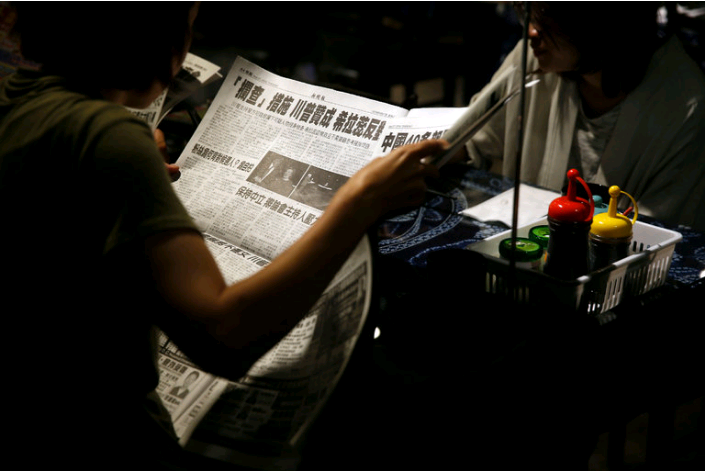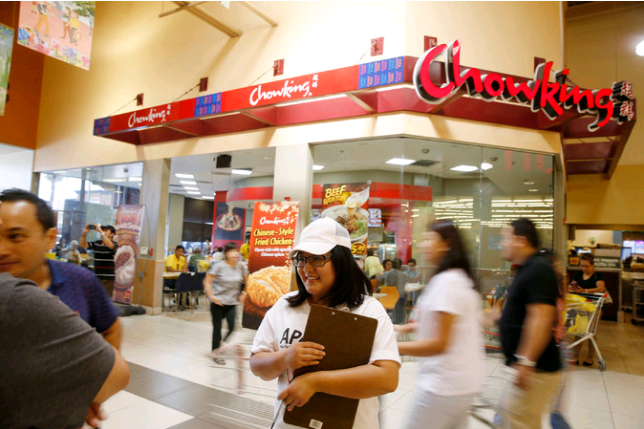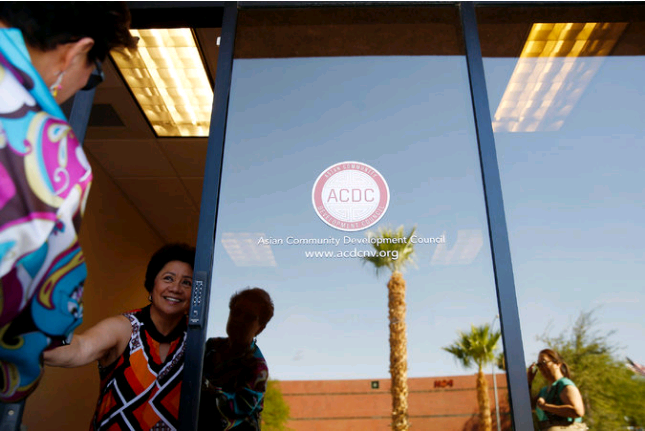
A diner reading a newspaper with coverage of Monday’s presidential debate at a restaurant in the Chinatown neighborhood of Las Vegas. Credit Isaac Brekken for The New York Times
LAS VEGAS — On paper at least, Asian-Americans seem like perfect Republicans. Many are small-business owners. Their communities tend to be more culturally conservative. And a lot of them, having fled oppressive Communist governments, found comfort in the Republican Party’s aggressive anti-Communist policies.
But in what could be a significant realignment of political allegiance, Asian-Americans are identifying as Democrats at a quicker pace than any other racial group. And many Republicans worry this election will only accelerate that trend, damaging their party for years to come with what is now the fastest-growing minority in the country.
The Republican presidential nominee, Donald J. Trump, is not helping. His attacks on the Chinese — which he has sometimes delivered in a crude, mocking accent — are a feature of his populist campaign. He has suggested cutting off immigration from the Philippines, citing fears that the longtime American ally poses the same national security threat as countries like Syria and Afghanistan.
Mr. Trump’s talk of deporting millions of undocumented immigrants has also stirred up painful memories among a group that has been singled out under American law before, whether by the Chinese Exclusion Act, which barred the immigration of Chinese laborers until 1943, or by the internment of Japanese-Americans during World War II.
“It’s like we’re going back in time,” said Marc Matsuo of Las Vegas, who grew up in Hawaii with parents of Japanese ancestry and recalled how his family used to feel uncomfortable expressing their heritage, to the point they would not speak Japanese. He now helps register Asian-Americans to vote. “I was always brought up that you don’t talk about religion, you don’t talk about politics. Not anymore.”
Though Asian-Americans are still just 4 percent of the overall eligible voting population, their political power is concentrated in important swing states like Nevada and Virginia, where both parties have been building on their efforts to reach out.
In and around Las Vegas, home to one of the country’s largest Asian populations, this means printing campaign leaflets in Korean, having a Vietnamese translator on standby at speeches, publishing op-ed articles in the local Filipino newspaper and hiring employees who know enough Mandarin to recruit voters at the Chinatown seafood market.

Edna Imperial of the Asian Pacific American Labor Alliance registered voters on Friday at a shopping center in Las Vegas. Credit Isaac Brekken for The New York Times
Hillary Clinton’s campaign has a resident staff member in Las Vegas dedicated to Asian-Americans and Pacific Islanders. Staff members and volunteers here speak Chinese, Korean, Hindi and Tagalog, the Filipino language. The campaign has recently been conducting native language training on how to use voting machines in a local Chinese cultural center. Volunteers are sent to court supporters in Buddhist temples.
Though Mr. Trump’s campaign announced a new Asian Pacific American Advisory Committee last week, a Republican National Committee spokesman, Ninio Fetalvo, said Mr. Trump’s outreach to Asian-American voters had been coordinated until now mainly through two staff members at the party’s Washington headquarters. The party, he added, has also printed materials in a variety of Asian languages in cities like Las Vegas.
Republicans’ difficulties with Asian-Americans are similar to those the party has faced with most minority groups. A sense that the party is hostile to immigrants and minorities has driven more Asian-American voters into the Democratic Party lately, political scientists and community leaders said. And if Republicans do not make more of an effort, those voting shifts could harden, just as Hispanics’ voting patterns have.
“What we see now are some early indications that people who either leaned toward the Democratic Party or did not identify with either party are now starting to identify as Democrats,” said Karthick Ramakrishnan, a professor of political science at the University of California, Riverside. “This is still a group that is making up its mind,” he added, “but it should be concerning to the Republican Party that you’re starting to see this crystallization.”
A national survey in the spring by Asian and Pacific Islander American Vote, a nonpartisan research group, showed “a significant leftward shift” since 2012 among Asian-American registered voters, with 47 percent now identifying with the Democratic Party, compared with 35 percent in 2012. Fifteen percent identified as Republican.
In 1992, the year national exit polls started reporting Asian-American sentiment, the group leaned Republican, supporting George Bush over Bill Clinton 55 percent to 31 percent. But by 2012, that had reversed. Asian-Americans overwhelmingly supported President Obama over Mitt Romney — 73 percent to 26 percent, almost the same margin by which Hispanics favored Mr. Obama.
A Pew Research Center report released last month showed that Asian-Americans have since 2008 embraced the Democratic Party at a faster rate than any other ethnic group.
Still, many Republicans believe that the damage is reversible and see Asian-Americans’ political identity as still very young and malleable. For example, among many Asian-Americans, there is a tendency to be less forgiving on illegal immigration, which is sometimes seen — unfairly or not — as an issue specific to Latinos.
Lanhee Chen, who was Mitt Romney’s policy director in 2012, said the effect of Mr. Trump’s harsh talk on immigration could be more muted with Asian-Americans than it is with other minorities. “Trump has not been helpful,” Mr. Chen said. “Now is it as directly harmful as it would be to Latinos? I don’t think so.”
As Asian-Americans have replaced Hispanics as the nation’s fastest growing racial group, Nevada has become the center of their emerging political class. Asian-Americans are now about 7 percent of the electorate in the state, a figure that is expected to double by 2060.

Volunteers arriving for a get-out-the-vote effort at a phone bank last month at the Asian Community Development Council in Las Vegas. CreditIsaac Brekken for The New York Times
Democrats and Republicans have concluded that winning in closely divided Nevada requires performing strongly among Asian-Americans: The state’s Republican senator, Dean Heller, carried Asian-Americans when he narrowly won in 2012. And Harry Reid, the state’s long-serving Democratic senator who is retiring, performed even better with them than he did among Hispanics in his 2010 election.
None of which is lost on the two candidates vying to succeed Mr. Reid: Representative Joe Heck, the Republican, employs an aide who speaks Mandarin and has made Kamayan dinners — traditional Filipino banquets — as much a campaign staple as marching in parades. And Catherine Cortez Masto, the Democrat, grew up in the Las Vegas neighborhood that has since become the city’s Chinatown, with Korean barbecue restaurants, Vietnamese noodle bars, foot spas and Chinese arches. When she attended a lunar celebration last month, she spoke in English as someone translated her words into Vietnamese.
As much as Mr. Trump’s positions seem to be driving Asian-Americans into the Democratic Party, the group defies easy political categorization. Many Koreans are evangelical Christians. Filipinos overwhelmingly belong to the Roman Catholic Church. Many Vietnamese who emigrated during the war identify closely with the Republican Party’s anti-Communism.
“In general, Asian values are very much in line with Republican values: family, education, the country needs to be stable,” said James Yu, a member of the Las Vegas Asian Chamber of Commerce, which has endorsed Mr. Heck in the Senate race. Notably, it has not backed Mr. Trump.
By November, about 9.3 million Asian-Americans will be able to vote nationally, or 4 percent of the eligible voting population. That is up from eight million in 2012. And that growth has spawned new civic organizations, like the nonpartisan Asian Community Development Council in Las Vegas, which aims to boost the group’s low voter turnout. Only 47 percent of eligible Asian-Americans voted in 2012.
Vida Chan Lin, the group’s founder, said that her message each time she goes out to register Asian-Americans to vote — in casinos’ employee lunchrooms, in Chinatown shopping malls and at employee orientations for businesses like the Panda Express fast-food chain — is that they have to harness the power of their growing numbers.
“We’ve got to get them to vote,” Ms. Lin said in her office, which was humming with volunteers planning registration drives, as well as follow-up calls as reminders to vote.
One positive consequence of Mr. Trump’s divisiveness, she said, was that interest in the election is like nothing she has ever seen. And the chatter about it follows her everywhere, she added: “When I went to China, they were talking about it.”
Correction: October 1, 2016
